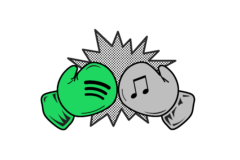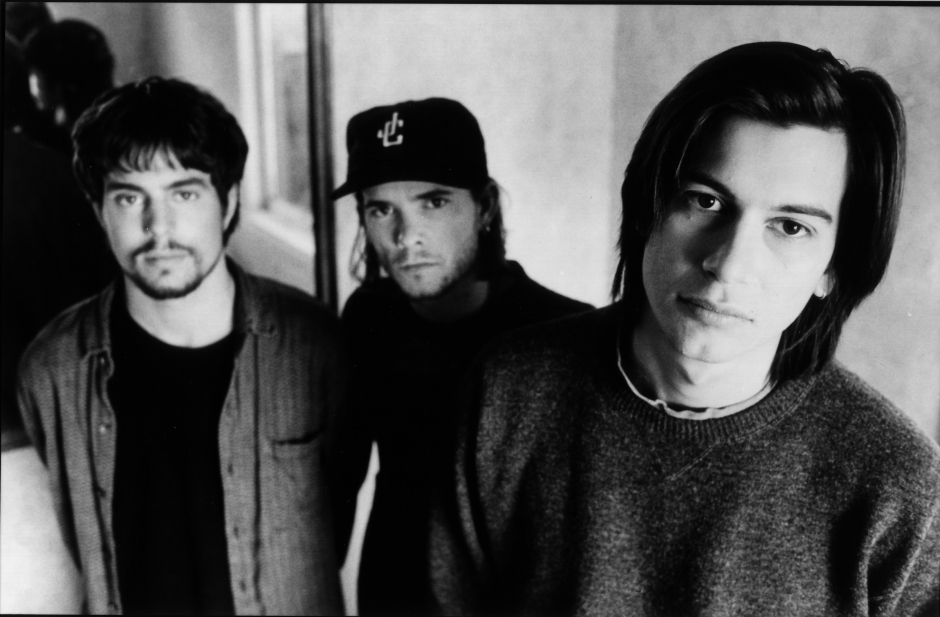Failure are reuniting! Yes, the Fantastic Planet Failure. They’ve got a show at the El Rey in Los Angeles on February 13, 2014, with the open threat of more gigs, new music, etc. So rejoice, fans of ’90s art-rock cult masterpieces and/or people who go to concerts mostly to stare at the guitarists’ hands/pedals. This is gonna kick ass.
The L.A. trio debuted in 1992 with the abrasive alt-metal dirge Comfort (Steve Albini produced; the band never cared for it) and found a fuller, bolder Helmet-with-slightly-more-empathy lane on Magnified two years later. But 1996’s Fantastic Planet is the almighty jam: a 17-track beast (track 12: “Segue 3”; track 14: “Another Space Song”) of guitar-antihero theatrics and studio-as-instrument bummer luxury: It didn’t exactly top the charts, but everyone who heard it bought a phaser or 12. As an intro, sample three of Alternative Nation’s best-ever power ballads: “The Nurse Who Loved Me,” “Blank,” or very minor MTV hit “Stuck on You.”
From there, they hit Lollapalooza 1997 (the last original year), but broke up soon thereafter: label woes, vague personal acrimony, the usual. The reunion boasts the “classic” Fantastic Planet lineup: frontman Ken Andrews, fellow songwriter/multi-instrumentalist Greg Edwards, and late-arriving drummer Kelli Scott. Andrews in particular had kept busy in the interim, between side projects (ON, Year of the Rabbit) and studio gigs: He mixed the latest record from Paramore, who’ve covered “Stuck on You.” Here, he chats with SPIN about the joys of being a “band’s band,” the perils of having too much depth, and his dreams of a brighter, larger-font tomorrow.
You guys have been on my Dream Reunion list for years and years — what finally convinced you to do this?
Well, I think it’s basically because my friendship with Greg was rekindled in the last four or five years — because we both have five-year-olds. I think that helped break the ice for us, to spend time together as friends, because the breakup in ’97 was not pleasant. We needed a couple years to hang out and be friends again, and then it became this sort of elephant in the room, like, “Why don’t we do some music together?”

Also Read
We Need to Talk About Spotify
So mostly we can thank your children.
I would say that definitely — that helped, a lot. It helped both of us get our heads in a different place. And an awful lot of time passed, also, before we both had kids. There was a lot of time to forgive and forget.
So will new music come out of this? Another full album? How elaborate is the current plan?
I don’t really know. At this point, the only for-sure plan is this show at the El Rey. I have a feeling it’s gonna turn into more than that. We haven’t finished anything yet, but we have a few recordings that show that we have something left to say musically.
Have you made it out much as a civilian to Coachella, to the revamped Lollapalooza, that sort of thing? Are you wondering how large a font “Failure” would be in on a Bonnaroo lineup poster?
Yeah. Yes. That’s a big question we all have right now. Strangely, it’s almost like we died, because when you die, you get more famous. We kind of broke up right before we ever got big. But what’s weird is that it sort of feels like we got more notoriety and maybe even more popularity after we broke up. It’s rare that I meet someone in the music business that doesn’t know Fantastic Planet, at least that record.
So we felt like, if we came back, we at least wouldn’t be starting from scratch. We’d at least be where we were, or a little bit higher. We’re not fooling ourselves — we don’t think we’re any giant band that’s gonna be headlining any of the festivals. At least right away.
Did you have any sense at the time that over time, Fantastic Planet would take on that reputation, would become a “cult classic” sort of thing?
No. No, I definitely did not. At the time, we knew that our music was something maybe people didn’t really get the first listen. We found that criticism to be accurate, but also frustrating, because people in the business were using it as an excuse for why we weren’t selling more records or something. “It’s great to have depth, but sometimes you can have too much depth” — I remember that being said by someone.
We didn’t know how to internalize that criticism and change anything we were doing. We just did what we liked. In that sense, I feel somewhat vindicated, that people are getting it now. That was maybe the other thing: All the years that have gone by, maybe that’s helped people appreciate it more.
Fantastic Planet always struck me as ideal for the “play a whole album live from start to finish” treatment — all the segues. Is there any chance of that?
We’ve talked about doing that quite a few times, and I think eventually we may do that, but we are not gonna do that for the first show. Because we really want to do some of the older songs. I would say 50/60 percent will be from Fantastic Planet. But there’s at least four, five, six other songs from the first two records that we really want to play live, because I think we actually play them live better than they’re recorded, and we just really enjoy them. But we want to do that eventually.
At the time, Fantastic Planet sounded like it took hundreds of guitar pedals, months of studio time, and millions and millions of dollars — even for its time it seemed like this incredibly extravagant, decadent thing. Was it as complicated, as painstaking as it seemed?
Yes. But it didn’t cost millions of dollars: We actually made it pretty cheaply, because we took our budget and bought recording equipment ourselves, so we were never really in the studio paying $2,000 a day — we were renting a house and paying $2,000 a month.
We didn’t have an agenda, but we had a plan to go into the studio and make the best record we possibly could, and not come with everything pre-written. We had no full-on demos. We did have a lot of jam tapes — I’m talking, like, over 100 hours of jams that I whittled down to maybe 12 hours — and that became our well, basically. Once we finished a song, we’d go, “OK, let’s go back to the well, and see if we can find any little nuggets that sound cool,” which would be a jumping-off point to write a song around. And we did each song one at a time — we didn’t do the factory mode of “Let’s do all the drums for the whole record first.”
I felt like we’d had a couple negative experiences where we had demoed stuff in such detail that by the time we went to record it for real, we’d lost the spark. And it became more of a technical exercise, rather than discovering the coolness of the song, if that makes sense. So it was sprawling in the sense that we spent seven months making that record from top to bottom, but we were writing and recording it all at the same time. We were averaging two weeks a song or something like that.
Working backward, it’s striking how harder-edged and metallic Magnified and Comfort are — they sound more like Helmet than anything you’d call “space rock.” Is Fantastic Planet truer to how you always wanted to sound, or did you slowly evolve into that?
I think a little of both, actually. It’s truer in the sense that we didn’t use any outside producers or mixers —it was just the three of us, we made that record top to bottom. So in that sense, it’s the real us: This is what we do when we’re left alone. But we were constantly evolving as a band. Comfort, that was with the original drummer [Robert Gauss], who wasn’t on anything after that — he had a real impact on the songwriting beyond just his drum parts, and he was from more of a punk-y ethic, keeping it minimal on the production. He and Steve Albini got along well in terms of that aesthetic.
Greg and I weren’t — we didn’t have any problem theoretically with lots of layers, but we thought, “It’s our first record, we can do more of a stripped-down record.” And songwriting-wise, that record is mostly my songs in terms of the writing; on Magnified we became more of a songwriting duo, and by the time we got to Fantastic Planet, Greg ended up writing more lyrics than I did. I think we both wrote the same amount of music, but my role as the sonic engineer and crafter of the recordings left more time for Greg to work on lyrics. He was a little more interested in that than I was, too.
That lyrical content was generally pretty dark — hospitalization, isolation, mental illness, burnt spoons, that sort of thing. I have to hope you’re coming at this stuff from a better place than you were at the time. Will getting back into that headspace be a challenge at all?
No, I can get back into it — it was a while ago, but it — it doesn’t make me feel dark per se. Sometimes when we’re playing the old stuff, it does bring back memories of specific things, and that can be a little weird sometimes. But for the most part, the fact that it’s been this long, you look back with rose-colored glasses, so mostly what I’m remembering is the fun of playing these songs with these guys. I’ve done a number of projects since then, and it’s really dramatic: There’s something that happens when the three of us play together that I haven’t had in any other lineup before.
It’s funny to think about Failure in the context of the way alt-rock is canonized these days, whether it’s through a Pearl Jam documentary or a Nirvana reissue or a “20 Years of Siamese Dream” retrospective. Do you feel any connection to that era now? Does the Internet remember the ’90s the way you remember it?
I do think it was a good period overall for guitar music, for sure. I’m not a hater of the ’90s being brought back. For us it’s a little weird, because we also felt like outcasts during the grunge thing: We would often get mislabeled as dissonant grunge, which didn’t make any sense. People just — if it didn’t sound like the Seattle version of grunge, they were dismissive of it. It’s a bittersweet thing with me. We never really broke huge back then, so if people can get us now, as part of the whole ’90s resurgence, I can see that working to our advantage. But at the time? We had a tough time with it. We had heavy guitar, but we weren’t really grunge. It was hard.
So you’re doing one show in L.A. so far — when is that?
February 13.
The day before Valentine’s Day.
The day before Valentine’s Day, and the day after Lincoln’s birthday.




